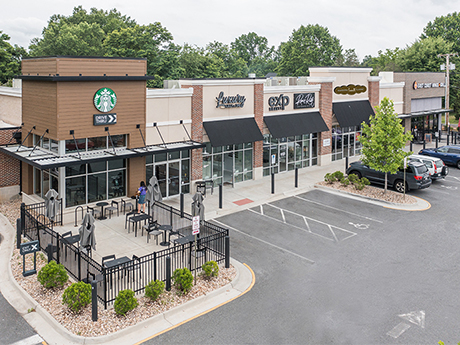LAGRANGE, GA. — Alliance Residential Co. has purchased 22.3 acres in LaGrange with plans to develop Prose LaGrange, a 315-unit apartment community. Designed by Dynamik Design, the community will feature one- and two-bedroom units averaging 992 square feet. Amenities will include a fitness center, resort-style pool, grilling stations, coworking spaces, clubhouse, business center, pet park and a 24/7 LuxerOne parcel management system. The property will have direct access crosswalks to WellStar West Georgia Medical Center, which houses 1,800 medical employees, as well as a new Publix-anchored shopping center. Alliance Residential plans to open first units at Prose LaGrange in fall 2023. This will be Alliance Residential’s first project in the LaGrange area, second Prose project along Interstate 85 South and fifth Prose community in Georgia. The Arizona-based developer recently opened Prose Fairview, a 318-unit apartment community in Covington, Ga.
Property Type
Cushman & Wakefield | Thalhimer Brokers $4.6M Sale of Retail Strip Center in Lynchburg, Virginia
by John Nelson
LYNCHBURG, VA. — Cushman & Wakefield | Thalhimer has brokered the $4.6 million sale of Shops at Phillips Circle, a retail strip center located at 19399 Forest Road in Lynchburg. Built in 2018, the center was fully leased at the time of sale to tenants including Starbucks Coffee, East Coast Wings and Nothing Bundt Cakes. The Charles and Margaret Levin Family LP based in Washington, D.C., purchased the property from Riverbend Development. Catharine Spangler, John Pritzlaff and Jenny Stoner of Thalhimer represented the seller in the transaction.
LEXINGTON, KY. — Academy Sports + Outdoors has opened an 80,000-square-foot store within South Park Shopping Center, a retail center located at 3200 Nicholasville Road in Lexington. Kaden Cos. is the landlord of South Park, which also houses Ulta Beauty, Best Buy, Burlington and Value City Furniture. The new store is the sixth Academy Sports location in Kentucky and its first in Lexington. Academy Sports plans to open nine stores this year and another 80 to 100 new locations over the next five years. The Katy, Texas-based company currently operates 264 stores across 17 states.
Agora Realty Starts Construction of 29-Acre Mixed-Use Project in Downtown North Las Vegas
by Amy Works
NORTH LAS VEGAS, NEV. — Agora Realty and Management has broken ground on a 29-acre mixed-use, master-planned commercial district in downtown North Las Vegas. The redevelopment project is located at the gateway to the city, east of Interstate 5 along Lake Mead Boulevard and north along Las Vegas Boulevard. Slated for completion in 24 months, the $105 million project will include 200,000 square feet of retail space and 125,000 square feet of healthcare and medical office space. Earlier this year, Agora started construction on a 22,000-square-foot medical office building that will include primary care and specialty services. The company plans to create a public space with children’s areas and event venues, as well as a large screen for outdoor presentations and movies. Agora also plans to incorporate micro-business suites that range in size from 150 square feet to 450 square feet. SCA Architects is doing construction drawings, and Mycotoo will work with Agora on design and programming for the micro-businesses and public space.
SUNNYVALE, CALIF. — Drawbridge Realty has acquired 200 S. Mathilda Avenue, a five-story, Class A office/engineering building and parking structure in downtown Sunnyvale. JP Morgan sold the asset for an undisclosed price. Completed in 2010, the property features 157,000 square feet with subterranean parking. Uber occupies the building as an engineering hub as part of its Bay Area global headquarters. The transit-oriented, LEED Silver-certified building is walkable to Sunnyvale’s Caltrain station and is surrounded by residential, retail and lifestyle amenities. Eastdil Secured represented the seller in the transaction.
FERNLEY, NEV. — Mark IV Capital, with Premier Design + Build as general contractor, has broken ground on a three-building distribution project totaling more than 1 million square feet in Fernley, 30 miles east of Reno. Known as Victory Logistics District Buildings B, C and D-2, the new facilities are part of Victory Logistics District, a master-planned industrial development on 4,300 acres owned by Mark IV Capital. Victory Logistics District has direct access to two transcontinental highways (Interstate 80 and U.S. Highway 50) and a rail line serviced by Union Pacific and BNSF. The 634,520-square-foot Building D-2 will feature 40-foot clear heights, 120 dock doors, four drive-in doors and state-of-the-art mechanical and electrical systems. Additionally, the Premier team will add parking for 332 autos and 312 trailers to the project. Totaling 217,447, Building C will offer 26 dock doors, two drive-in doors, state-of-the-art mechanical and electrical systems, 36-foot clear heights and parking for 191 autos and 42 trailers. The 169,820-square-foot Building B will feature 36-foot clear heights, 26 dock doors, two drive-in doors, state-of-the-art mechanical and electrical systems, a speculative office tenant improvement and parking for 172 autos and 43 trailers. The Premier project team includes Jeramy Mahfet, Greg Lew, …
MIG Real Estate Sells 168-Unit Ascent Apartments in Denver to Avanath Capital Management
by Amy Works
DENVER — MIG Real Estate has completed the disposition of Ascent Apartments, a garden-style multifamily property in Southwest Denver, to Avanath Capital Management. The price was not released. Located at 8400 E. Yale Ave., the nine-building community features 168 apartments in a mix of one-, two- and three-bedroom layouts. Community amenities include a fitness center, resort-style pool, barbecue and picnic areas, a playground and package lockers. Andy Hellman, Justin Hunt, Kevin Mckenna, Saul Levy, Chris Hart and Jessica Graham of CBRE’s Denver office represented the seller in the transaction.
Dunleer Acquires Nine-Building Windplay Business Center Industrial Park Near Sacramento for $14.9M
by Amy Works
EL DORADO HILLS, CALIF. — Los Angeles-based Dunleer has purchased Windplay Business Center, a nine-building industrial park in El Dorado Hills, for $14.9 million, or $147 per square foot, in an off-market transaction. Located at 5001-5009 Windplay Drive and 1100-1106 Windfield Way, the asset features 101,169 square feet spread across 21 units. Built between 1991 and 1994, the asset features 18- to 24-foot clear heights and is easily divisible for various tenant needs. At the time of sale, the park was 97 percent occupied. Sean Merold and Mike Metzger of JLL represented the buyer and undisclosed seller in the deal.
Joint Venture Explores Mixed-Use Redevelopment Options for 10-Acre The Galleria at White Plains
by Jeff Shaw
WHITE PLAINS, N.Y. — Pacific Retail Capital Partners (PRCP) and Aareal Bank have formed a new joint venture with SL Green Realty Corp. and the Cappelli Organization to consider redevelopment options for The Galleria at White Plains, a 10-acre indoor shopping mall in the New York City suburb of White Plains. The envisioned renovations to The Galleria are part of a larger renaissance for the area. The mall is part of a qualified Opportunity Zone, meaning that new investments in the area may be eligible for preferential tax treatment under certain conditions. Built in 1980 by Canadian developer Cadillac Fairview, the mall currently rises four stories and features approximately 865,000 square feet of retail space. The property, including its parking garages, spans two blocks adjacent to the White Plains train station, providing easy access to New York City. The Galleria is located at the intersection of Main Street and Dr. Martin Luther King Boulevard, and sits in proximity to multiple high-rise residential towers and office buildings, as well as Pace University’s Westchester campus and the White Plains City and Westchester County courthouses. According to the Galleria’s website, the mall currently includes retailers such as Forever 21, American Eagle and H&M, …
Population, Absorption, New Construction Offer Opportunities in the Denver Multifamily Market
by Jeff Shaw
By Chris Mitton, Advisor, Pinnacle Real Estate Advisors Denver has been seeing major growth of new residents from 2020 through the second quarter of 2022. Denver is gaining many residents from coastal cities due to our lower cost of living, and gains of such tech giants as Conga, RingCentral, Xactly, Slack, and Angi. Since 2020, Denver has added 8,100 jobs in business services and 2,900 jobs in the financial activities sector. Over the last five years population growth in Denver has increased 8 percent compared to the 3.8 percent national average. The multifamily market has benefited from this population growth. Denver has absorbed 6,400 units over the past 12 months, placing it in the top 15 metro areas in the country. Colorado has seen record high prices in single family homes as well, which is pricing out many first-time homebuyers. This is forcing many renters to stay in multifamily apartments. However, if you haven’t been living under a rock, you know that the Federal Reserve has been increasing interest rates at a record pace. The single-family market has seen an increase from 1,200 homes for sale during the start of the year to 7,300 homes in August. With this increase in supply …










